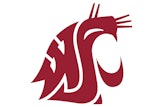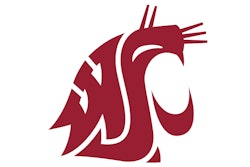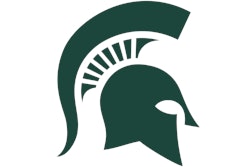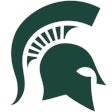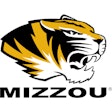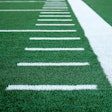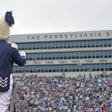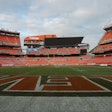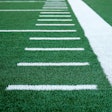![[Images courtesy of deerdistrict.com]](https://img.athleticbusiness.com/files/base/abmedia/all/image/2019/06/ab.startinglines619_feat.png?auto=format%2Ccompress&q=70&w=400)
Where there are plans for a new professional sports stadium or arena, odds are that plans exist for mixed-use development surrounding it. Increasingly, U.S. cities are looking to sports venues as anchors for destinations that incorporate everything from restaurants and retail to hotels and housing. John Shreve of Kansas City-based Populous told Building Design + Construction that every sports project the firm is working on "has some vision of mixed-use development."
Shifting sentiment regarding public financing of stadium and arena projects is helping drive the trend. It's no secret that sports venue financing deals have increasingly come under scrutiny, with today's taxpayers decreasingly keen on shelling out millions of dollars to finance lavish facilities for sports franchises owned by billionaires. Under the old model, promises of new jobs, new construction and new tax revenue were seldom realized. The new model of development offers a different approach.
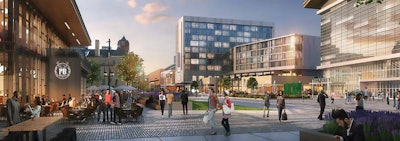
By investing in mixed-use entertainment districts, teams are taking a role in the economic development of the communities in which their venues reside — and reaping the benefits at the same time.
Take Milwaukee's Deer District — 30 acres surrounding Fiserv Forum, the city's newest sports arena and home to the NBA's Milwaukee Bucks and the Marquette University Golden Eagles. Once fully developed, the district will host dining and entertainment options, commercial space, and residential opportunities. A website dedicated to the project calls it "Milwaukee's newest neighborhood," embracing its multifaceted nature. If all goes according to plan, Deer District would become a go-to destination for events and entertainment year-round.
"You've got to become a catalyst," Bucks president Peter Feigin told The Atlantic. "We've got to really put the foundation in the ground and look to transform the city."
Leading the development effort is Head of the Herd Real Estate Development LLC, an affiliate organization operated by the owners of the Bucks. This arrangement allows the Bucks to collect non-basketball revenue even when the team isn't playing.
Leading the development effort is Head of the Herd Real Estate Development LLC, an affiliate organization operated by the owners of the Bucks. This arrangement allows the Bucks to collect non-basketball revenue even when the team isn't playing.
The same plaza and video board that hosted watch parties during the Bucks' 2019 NBA Playoffs appearances will host fitness classes and outdoor film screenings throughout the summer months, according to an announcement by Deer District officials.
The development already boasts four establishments on its entertainment block, most recently the 11,500-square-foot The MECCA Sports Bar and Grill, which aims to mimic the in-venue sports experience with LED ribbon boards displaying content from inside the arena wrapped around the second story. A new 112-unit apartment complex is slated to open in the district this summer, and there are more to come.

Deer District seems to be paying dividends for the Bucks by attracting people to the area earlier and enticing them to stay longer — regardless of what's taking place at Fiserv Forum.
"The fact that people are coming to venture out to explore and see the new structures and operations is incredible," Feigin told Forbes. "Not only does the time period get extended on the front end, but we are seeing lingering post-event, whether it's the Bucks, Marquette or concerts, with hundreds of people staying in the district for an hour-plus afterward. It is just what strategically we wanted, to make the district sticky with folks."
Deer District still has acres of land to develop. The next wave of projects is likely to include more residential inventory, as well as hotels and office space.
Offices pose an intriguing opportunity for teams looking to get into the real estate game. Just ask the Golden State Warriors, whose forthcoming Chase Center will anchor a downtown San Francisco district. Ride-hailing tech giant Uber is already set to occupy some of the office space around the Chase Center, meaning that the Warriors will essentially become Uber's landlord. "This is the foundation of our success for the next 40 years," Warriors president and COO Rick Welts told ESPN.
Are these districts capable of spreading the wealth? The jury is still out — but some data support the notion that broader development projects can generate a significant economic impact.
The Battery Atlanta, the mixed-use development anchored by the Atlanta Braves' SunTrust Park, offers residential and office space, dining, retail and events — even a boxing gym. All of that translates to foot traffic, and according to a report commissioned by the Cobb County Chamber of Commerce, an average total net impact of $18.9 million annually.
And the benefit hasn't been limited to just the immediate area around the ballpark. A press release detailing the development's impact describes a "Halo Effect," where property values in the area have increased by $4.5 billion since the project was announced.
Stadium- and arena-anchored development districts not only broaden the footprint teams have within a city, they deepen the relationships teams have with their cities and fans by weaving the sports venue into the fabric of the community itself.
This article originally appeared in the June 2019 issue of Athletic Business with the title "Will mixed-use arena districts spread the wealth?" Athletic Business is a free magazine for professionals in the athletic, fitness and recreation industry. Click here to subscribe.














